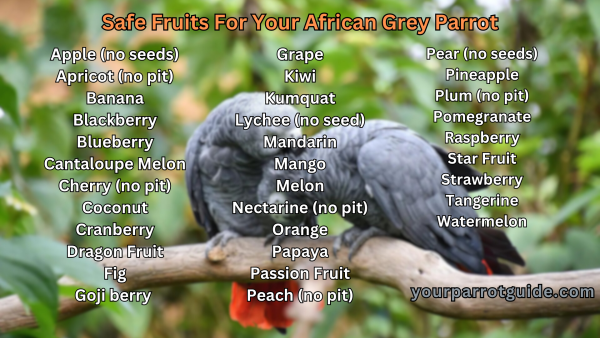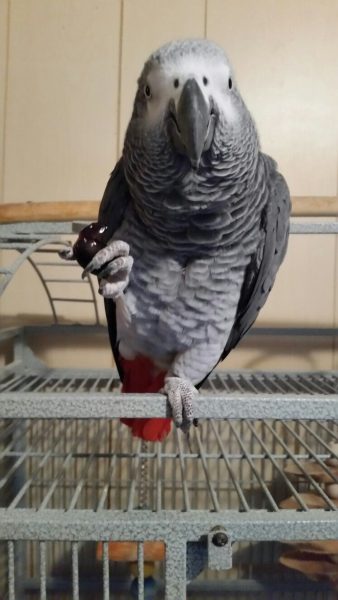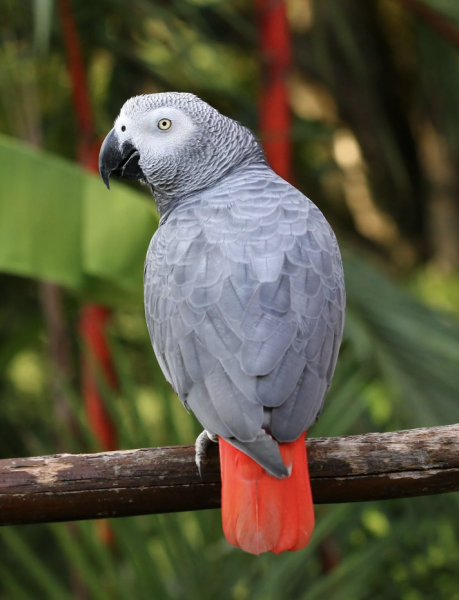Have you ever wondered if African grey parrots eat fruits? Which ones should they have and which should they avoid? What are their benefits? How to make them eat fruits and how to serve them? If yes, then this article is for you! Keep reading to find out how fruits affect your parrot’s health.
Importance of fruits in African grey’s diet
Feeding fruits to your African Grey Parrot is very important, as they can benefit from all of the nutrients, fibers, and antioxidants found in them. Providing them with a variety of fruits can help support their immune system and make it stronger.
Adding fruits rich in fiber, like apples and pears, to your African grey’s parrot diet can prevent digestive issues and restore their gut function. Also, due to the fruit’s antioxidant effect, they protect the body’s cells from being damaged and prevent health diseases later on.
Furthermore, giving a mix of fruits to your African grey parrot can help them with foraging behavior, mental nourishment and enrichment, and support their overall health and well-being. At this point, it is very important to mention that even though fruits can be beneficial for your African grey parrot, they can also be harmful if fed excessively, or if not cleaned properly before serving them.
List of safe fruits for your African grey parrot

Apples and pears are rich in dietary fiber that promotes digestive health. Apples are also rich in antioxidants that can help support heart health and the immune system. While pears can help with bone health due to them being a great source of Vitamin K. However, make sure you remove the seeds from them, as they can be really dangerous for your feathered friend.
Oranges are high in Vitamin C, thus they boost the immune system and provide hydration. Make sure you feed oranges to your little ones, especially during hot months or if you live in a dry climate. Lastly, strawberries and mangoes can support your African grey’s eye health as well as skin health.
All the berries, such as blackberries, blueberries, raspberries, cranberries, and goji berries, as well as pomegranates, are fruits high in antioxidants. Antioxidants can help protect cells from damage, support cardiovascular health and the immune system, as well as have anti-inflammatory effects.
Oranges, strawberries, mangoes, and pineapples are packed with vitamin C which supports the immune system. They also promote the production and function of immune cells. Even though African grey parrots can synthesize their own Vitamin C, these fruits can help your parrot while they are ill, under stress, or during the molting season. That being said, they should always be fed in moderation.
Even though fruits are not really high in Vitamin K compared to green vegetables, kiwis, pears and papayas contain a small amount of it. Vitamin K can help with blood clotting, promote brain health and contribute to the overall health and vitality of your African grey.

List of unsafe fruits for your African grey parrot
Even though fruits can be very beneficial and should be included in your African grey parrot’s diet, some fruits should be avoided at all cost and never be fed to your parrot.
Avocados are the number one toxic and unsafe fruit that your parrot should never eat. They are deadly to parrots and even a small amount can prove fatal. Keep avocados away from your house, or at least away from your parrot’s reach.
Seeds from certain fruits should be removed before feeding to your African grey parrots, as they can be harmful or even dangerous if swallowed. That includes pits from cherries, plums, peaches, nectarines, and apricots. Also, apple and pear seeds must always be removed as they can be toxic for your parrot.
Introducing Fruits to Your African Grey Parrot’s Diet
If your African grey parrot is not used to eating fruits, you can start slowly giving them small portions of fruits to get your pet used to them. Also, don’t forget that just as we humans don’t like all fruits and flavors, your parrot can also like and dislike some. That’s why offering small portions of different fruits can help you find out what they enjoy munching.
African grey parrots are very curious animals. They may get interested in what you are eating if you eat fruits in front of them. Thus, they will get used to them faster. Additionally, providing them with a variety of fruits can help as they start exploring the different flavors, shapes, and textures.

Precautions and Considerations
Fruits are a vital part of any parrot’s diet. However, make sure you only offer safe fruits to your parrots and avoid toxic and unsafe fruits. You can check some of them on the list above.
Moderation is the key to everything, as well as to the fruits that should be added to your African greys parrot diet. Offering a small amount of fruits to your parrots can be beneficial, but having them eat only fruits can be very dangerous as they won’t be getting the needed nutrients.
Providing fresh and clean fruits to your parrot is essential. Thoroughly clean the fruits with water and apple cider vinegar to get rid of any pesticides and dirt that may be on the fruits.
Also, don’t get scared if you see a change in the color or texture of your African grey parrot’s poop. For example, offering watermelon – which is mostly water – can make your parrot’s poop more watery. On the other hand, feeding them cherries will definitely make their poop slightly darker. Keep that in mind while you feed them fruits and don’t be worried if their poop is different on that day.
Last but not least, you should always consult your vet before making any changes to your African grey parrot’s diet or if you have any concerns or questions about feeding them certain fruits. Remember, it’s better if they don’t eat something than if they eat something that may harm them. So always do your research before feeding your lovely parrot anything new.
Conclusion
Fruits can be beneficial in many ways for your African grey parrot’s physical, as well as mental health. They provide them with many vitamins, fibers, and antioxidants that are essential for their health and can prevent them from getting ill. Even though they have many benefits, they should be fed in moderation and cleaned before serving. Always consult your avian vet if you are unsure whether a fruit is safe or not for your African grey parrot.

I didn’t knew about avocados 🥑 🥑 🥑 OMG 😳😳😳
Indeed 🙁 Avocados have a toxin called persin which is toxic to parrots. If ingested it will cause breathing difficulties, cardiac distress, and eventual heart failure. That’s why you should never allow your parrot to have avocados. For more information regarding toxic foods for your African Grey parrot, you can check this article: https://yourparrotguide.com/african-grey/toxic-foods-for-african-grey-parrots/